On a visit to Hollywood, Ernst Lubitsch was contracted by Mary Pickford, who wanted him to direct her in Dorothy Vernon of Haddon Hall. Upon arrival, he rejected the project and directed her instead in Rosita (1923). During the production, the two giants of the silent cinema reportedly clashed.
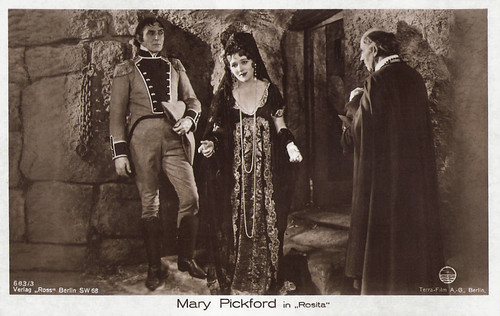
German postcard by Ross Verlag, no. 683/3. Photo: Terra Film A.G., Berlin. Publicity still for Rosita (Ernst Lubitsch, 1923).
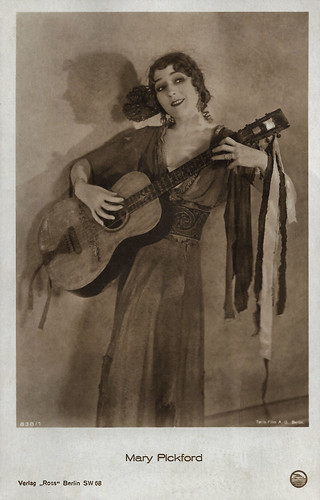
German postcard by Ross Verlag, no. 838/1. Photo: Terra Film A.G., Berlin. Publicity still for Rosita (Ernst Lubitsch, 1923).
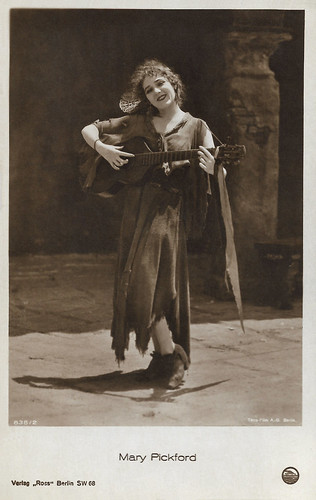
German postcard by Ross Verlag, no. 838/2. Photo: Terra Film A.G., Berlin. Publicity still for Rosita (Ernst Lubitsch, 1923).
Mary Pickford and Ernst Lubitsch planned Rosita (1923) as the first of four films they would make together for Mary Pickford Films and United Artists. Rosita was meant as Mary Pickford's first adult role. She wanted to abandon her 'little girl with the curls' persona.
Rosita is based upon the 1872 opera Don César de Bazan of Adolphe d'Ennery and Philippe Dumanoir. In a mythical 16th Century Spain the lecherous King (Holbrook Blinn) has cast his eye on a popular but provocative peasant singer (Mary Pickford) who performs in the streets of Seville. She, in turn, yearns for the handsome young nobleman (George Walsh, brother of the celebrated director Raoul Walsh), who has rescued her from the angry king’s guards and has been condemned to a dungeon for his troubles.
Ernst Lubitsch had hesitated about making it, but Pickford eventually convinced him to work on the project. According to IMDb, the role of Don Diego was first offered to Ramon Novarro, on Mary Pickford's urging. He rejected it, however, because Pickford had once stated that his "face and body don't match".
Several postcards with pictures of Pickford and Lubitsch happily working together on the production were produced, despite rumours concerning a contentious on-set relationship between the superstar and her director. By all accounts, he film was a major critical and commercial success on its first release. Rosita earned over $1,000,000. In later years, Pickford turned against the film: in an interview with film historian Kevin Brownlow, Pickford said, "Oh, I detested that picture!... I disliked the director... as much as he disliked me."
Pickford demanded all copies of the film to be ruined. When she handed her films over for preservation she refused to hand over Rosita, except for the fourth reel. Rosita was considered a lost film until a nitrate print was discovered in the Russian archives and repatriated by the Museum of Modern Art in the 1960s. A safety preservation negative was made from the nitrate print, but no further work was done on the film because of the expense and difficulty of recreating the English intertitles.
Happily, a copy of a complete continuity script, which includes all of the intertitles, surfaced in the collection of the Academy of Motion Picture Arts and Sciences. Using the titles in Pickford’s preserved fourth reel as a template, new intertitles were created to match the original. MoMA presented the restored version in 2017 at the 74th Venice International Film Festival.
At AllMovie, Janiss Garza reviews: "For reasons still not clear, Pickford came to hate this film, claiming it was the worst one she ever made. On the contrary, it's excellent entertainment and while the star is not at her very best, she still puts in a decent performance. In its day Rosita was well received critically, and it made money for United Artists. It holds up better today than some of Pickford's other vehicles."
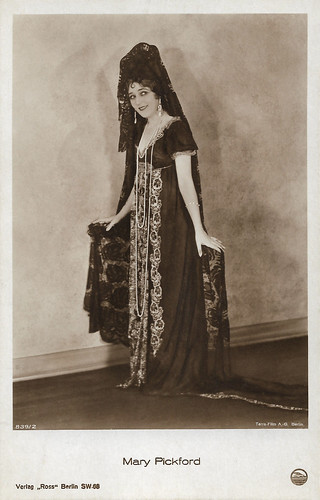
German postcard by Ross Verlag, no. 839/2. Photo: Terra Film A.G., Berlin. Publicity still for Rosita (Ernst Lubitsch, 1923).

German postcard by Ross Verlag, no. 581/2, 1919-1924. Photo: B.B.B. Collection: Didier Hanson.
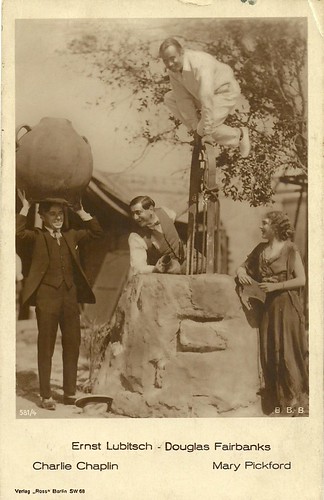
German postcard by Ross Verlag, no. 581/4, 1919-1924. Photo: B.B.B. Collection: Didier Hanson.
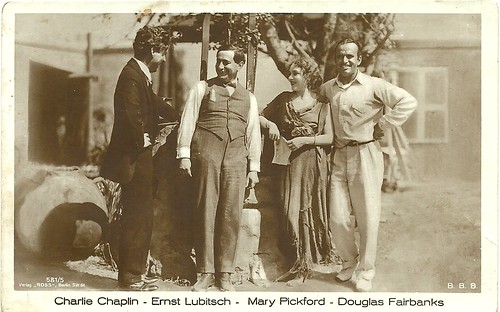
German postcard by Ross Verlag, no. 581/5, 1919-1924. Photo: B.B.B. Collection: Didier Hanson.
Sources: Janiss Garza (AllMovie), The Film Foundation, Wikipedia and IMDb.

German postcard by Ross Verlag, no. 683/3. Photo: Terra Film A.G., Berlin. Publicity still for Rosita (Ernst Lubitsch, 1923).

German postcard by Ross Verlag, no. 838/1. Photo: Terra Film A.G., Berlin. Publicity still for Rosita (Ernst Lubitsch, 1923).

German postcard by Ross Verlag, no. 838/2. Photo: Terra Film A.G., Berlin. Publicity still for Rosita (Ernst Lubitsch, 1923).
A contentious on-set relationship
Mary Pickford and Ernst Lubitsch planned Rosita (1923) as the first of four films they would make together for Mary Pickford Films and United Artists. Rosita was meant as Mary Pickford's first adult role. She wanted to abandon her 'little girl with the curls' persona.
Rosita is based upon the 1872 opera Don César de Bazan of Adolphe d'Ennery and Philippe Dumanoir. In a mythical 16th Century Spain the lecherous King (Holbrook Blinn) has cast his eye on a popular but provocative peasant singer (Mary Pickford) who performs in the streets of Seville. She, in turn, yearns for the handsome young nobleman (George Walsh, brother of the celebrated director Raoul Walsh), who has rescued her from the angry king’s guards and has been condemned to a dungeon for his troubles.
Ernst Lubitsch had hesitated about making it, but Pickford eventually convinced him to work on the project. According to IMDb, the role of Don Diego was first offered to Ramon Novarro, on Mary Pickford's urging. He rejected it, however, because Pickford had once stated that his "face and body don't match".
Several postcards with pictures of Pickford and Lubitsch happily working together on the production were produced, despite rumours concerning a contentious on-set relationship between the superstar and her director. By all accounts, he film was a major critical and commercial success on its first release. Rosita earned over $1,000,000. In later years, Pickford turned against the film: in an interview with film historian Kevin Brownlow, Pickford said, "Oh, I detested that picture!... I disliked the director... as much as he disliked me."
Pickford demanded all copies of the film to be ruined. When she handed her films over for preservation she refused to hand over Rosita, except for the fourth reel. Rosita was considered a lost film until a nitrate print was discovered in the Russian archives and repatriated by the Museum of Modern Art in the 1960s. A safety preservation negative was made from the nitrate print, but no further work was done on the film because of the expense and difficulty of recreating the English intertitles.
Happily, a copy of a complete continuity script, which includes all of the intertitles, surfaced in the collection of the Academy of Motion Picture Arts and Sciences. Using the titles in Pickford’s preserved fourth reel as a template, new intertitles were created to match the original. MoMA presented the restored version in 2017 at the 74th Venice International Film Festival.
At AllMovie, Janiss Garza reviews: "For reasons still not clear, Pickford came to hate this film, claiming it was the worst one she ever made. On the contrary, it's excellent entertainment and while the star is not at her very best, she still puts in a decent performance. In its day Rosita was well received critically, and it made money for United Artists. It holds up better today than some of Pickford's other vehicles."

German postcard by Ross Verlag, no. 839/2. Photo: Terra Film A.G., Berlin. Publicity still for Rosita (Ernst Lubitsch, 1923).

German postcard by Ross Verlag, no. 581/2, 1919-1924. Photo: B.B.B. Collection: Didier Hanson.

German postcard by Ross Verlag, no. 581/4, 1919-1924. Photo: B.B.B. Collection: Didier Hanson.

German postcard by Ross Verlag, no. 581/5, 1919-1924. Photo: B.B.B. Collection: Didier Hanson.
Sources: Janiss Garza (AllMovie), The Film Foundation, Wikipedia and IMDb.
No comments:
Post a Comment